Former Jeff Sessions Chief of Staff eyed for key role in Donald Trump White House
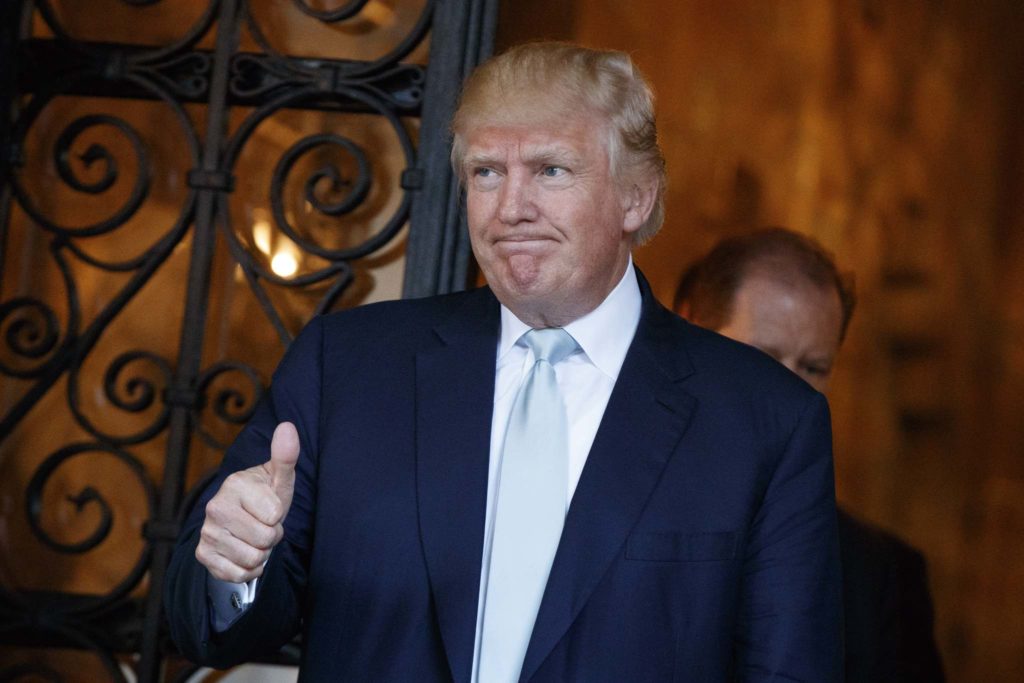
Rick Dearborn, former chief of staff to Alabama Sen. Jeff Sessions, is being eyed for a significant role in the White House as deputy chief of staff. As reported by POLITICO, Dearborn frequently works out of New York City and is running the day-to-day transition efforts, which earned him the respect of several key Donald Trump family members, such as son-in-law Jared Kushner. Sources close to the transition tell POLITICO that Dearborn has also had access to Trump’s inner circle for several months since joining the campaign. Working in the White House, Dearborn — described as a well-liked guy and workaholic — will oversee the office of legislative affairs and collaborate with Cabinet secretaries, working alongside Joe Hagin and Katie Walsh, two long time D.C. operatives also working as deputy chiefs of staff. He is also respected by both anti-abortion activists and Heritage Foundation members for his serious conservative credentials — something many saw as a necessary component for the Trump campaign during the Republican primary. Dearborn had served as assistant secretary for congressional and intergovernmental affairs at the Energy Department under George W. Bush, and later as Sessions’ legislative director before becoming chief of staff. He also worked as an aide to former Republican Sen. Trent Lott, who now a top player on K Street. For three years in the 1990s, Dearborn provided congressional relations for the Heritage Foundation, giving him a good working relationship with Heritage people now on the Trump transition.
Bill and Hillary Clinton to attend Donald Trump inauguration
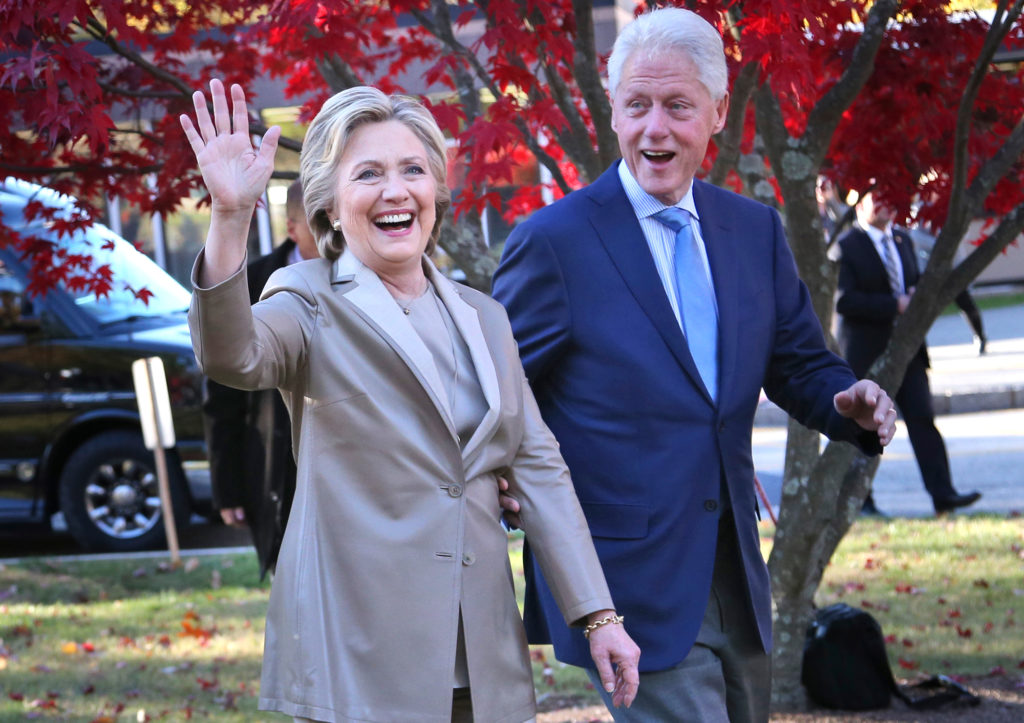
Falling in line with tradition, Bill and Hillary Clinton plan to attend Donald Trump’s inauguration. It’s a decision that will put Hillary Clinton on the inaugural platform as her bitter rival from the 2016 campaign assumes the office she long sought. The Clintons announced their decision to attend the Jan. 20 inauguration shortly after former President George W. Bush’s office said Tuesday he would attend along with former first lady Laura Bush. The Bushes are “pleased to be able to witness the peaceful transfer of power — a hallmark of American democracy — and swearing-in of President Trump and Vice President Pence,” Bush’s office said in a statement. It is traditional for former presidents and their spouses to attend the inauguration. But the decision to attend was fraught for the Clintons, given Hillary Clinton’s bitter campaign against Trump. The 2016 Democratic presidential nominee has largely avoided public appearances since Trump defeated her in November. Bush, too, has had a difficult relationship with Trump. His brother Jeb ran against Trump in the GOP primaries. George and Laura Bush let it be known they voted for “none of the above” for president rather than cast a ballot for Trump, but the ex-president did call to congratulate Trump after his victory. Former President Jimmy Carter and his wife, Rosalynn, earlier said they plan to attend Trump’s inaugural. Former President George H.W. Bush, 92, and his wife, Barbara, do not plan to attend the inauguration due to the former president’s age and health, his office said. Republished with permission of the Associated Press.
Marijuana advocacy group moves to block Jeff Sessions’ AG Nomination

Despite the fact marijuana remains illegal on the federal level, following Election Day, 65 million Americans now live in states that authorize adult recreational use. Which is precisely why the marijuana industry is uneasy over the notion of Alabama Sen. Jeff Sessions being confirmed as the United States’ next Attorney General — as leader of the Justice Department, the outspoken marijuana-opponent would have the power to force marijuana-friendly states into compliance with federal law. “We need grown-ups in charge in Washington to say marijuana is not the kind of thing that ought to be legalized, it ought not to be minimized, that it’s in fact a very real danger,” Sessions said at a Senate hearing in April. As Sessions confirmation hearings are poised to begin next week, the DCMJ, the group that spearheaded the successful campaign to legalize marijuana in the District of Colombia, on Tuesday kicked off an effort to urge the Senate to stop Sessions from becoming the next AG in order to protect the burgeoning industry. “We have come to assume Senator Sessions will overturn the will of more than 70% of the voters in the District of Columbia that voted for full legalization if made Attorney General,” said DCMJ co-founders Adam Eidinger and Nikolas Schiller in a letter to the Senate. “He will be empowered to ignore the 60% of Americans, who support legal cannabis or the more than 80% of U.S. citizens, who support the legalizing cannabis for medical purposes.” The letter continued, “The facts are that a legal cannabis industry: provides tens of thousands of jobs to hardworking, law-abiding citizens; stops unjust laws that disproportionately impact minorities; furnishes access to life-changing treatments for critically ill patients; empowers responsible small business owners over criminal dealers and cartels; generates valuable economic development, jobs, and provides much needed revenues for strapped state budgets.” The DCMJ and other drug reform advocates can’t be certain of Sessions’ agenda as AG until the confirmation hearing begins Tuesday. Nevertheless they’re prepared to fight if necessary. “We will use all practical means to fight the threat Sessions poses to overturn the will of the voters, ignore science and medical professionals and put black market marijuana back in the hands of international organized crime rings,” Eidinger said.
Congress ushers in new era of all-Republican rule
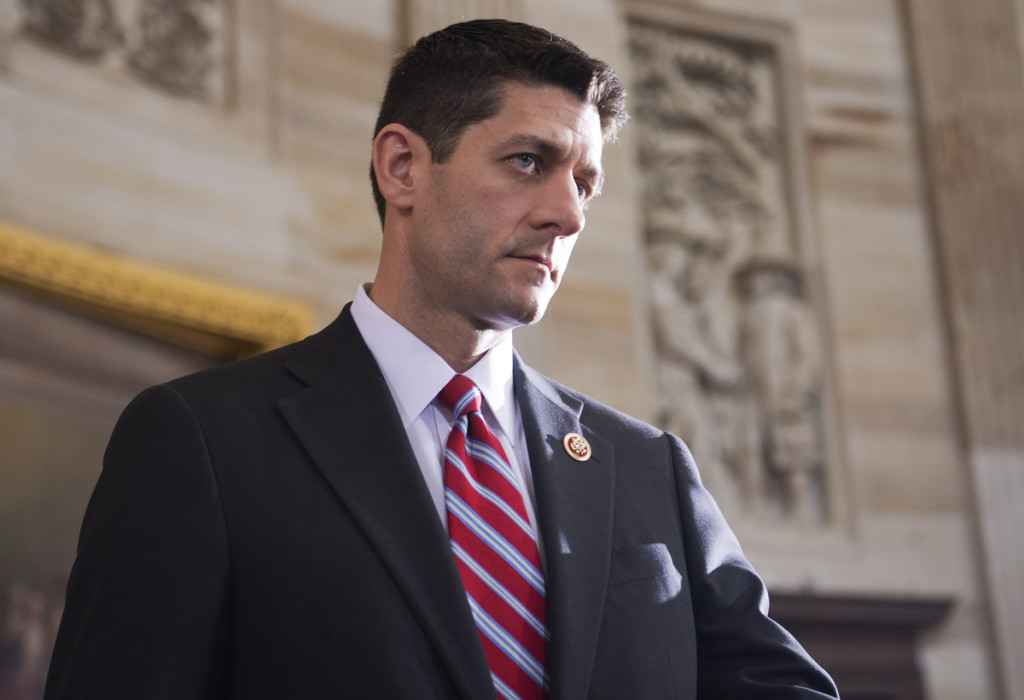
Congress ushers in a new era of all-Republican rule. On Tuesday at noon, with plenty of pomp and pageantry, members of the 115th Congress will be sworn in, with an emboldened GOP intent on unraveling eight years of President Barack Obama’s Democratic agenda and targeting massive legacy programs from Franklin D. Roosevelt and Lyndon B. Johnson such as Social Security and Medicare. In the election, Republicans kept their tight grip on the House and outmaneuvered the Democrats for a slim majority in the Senate. In less than three weeks, on the West Front of the Capitol, Chief Justice John Roberts will administer the presidential oath to Donald Trump, the GOP’s newfound ally. First up for Republicans is repeal and delay of the health care law, expediting the process for scrapping Obama’s major overhaul but holding off on some changes for up to four years. The tax code is in the cross-hairs. Conservatives want to scuttle rules on the environment and undo financial regulations created in the aftermath of the 2008 economic meltdown, arguing they are too onerous for businesses to thrive. The only obstacle to the far-reaching conservative agenda will be Senate Democrats who hold the power to filibuster legislation, but even that has its political limitations. Twenty-three Democrats are up for re-election in 2018, including 10 from states Trump won, and they could break ranks and side with the GOP. Here are a few things to know about Congress: — BY THE NUMBERS Vice President Joe Biden, in one of his final official acts, will administer the oath to 27 returning senators and seven new ones. Republicans will have a 52-48 advantage in the Senate, which remains predominantly a bastion of white men. There will be 21 women, of whom 16 are Democrats and five, Republicans; three African Americans, including California’s new Democratic senator Kamala Harris, and four Hispanics, including Nevada’s new Democratic senator Catherine Cortez Masto. Across the Capitol, the House is expected to re-elect Rep. Paul Ryan as Speaker, with all the campaign-season recriminations involving the Wisconsin Republican and Trump largely erased by GOP wins. Once sworn in, Ryan will then administer the oath to the House members. The GOP will hold a hefty 241-194 majority in the House, including 52 freshmen – 27 Republicans, including Wyoming’s Liz Cheney, daughter of former Vice President Dick Cheney, and 25 Democrats. — CONFIRMING THE CABINET The Senate will exercise its advice and consent role and consider nominations of 15 department secretaries and six people tapped by Trump to lead agencies or serve in roles with Cabinet-level status, such as the EPA and U.N. ambassador. Democrats won’t make it easy. Several in the party have been highly critical of several of Trump’s choices, from Rick Perry, who forgot during the 2012 presidential campaign that the Energy Department was the one he wanted to eliminate, to Treasury pick Steve Mnuchin, the former Goldman Sachs executive whom Democrats have dubbed the “foreclosure king” for his stake in OneWest Bank that profited from the foreclosure crisis. Others nominees, such as retired Marine Corps Gen. James Mattis for defense secretary, should easily win confirmation. First, though, Congress must pass a law allowing the former military man to serve in a civilian post. There is a limit to what Democrats can do. Rules changes in 2013 allow some nominees, including Cabinet picks, to be confirmed with a simple majority, preventing Democrats from demanding 60 votes to move forward. — SUPREME COURT VACANCY Adding to the drama of the new Congress will be high-profile confirmation hearings for Trump’s nominee for the Supreme Court. Justice Antonin Scalia died last February and Republicans refused to consider Obama’s nominee, Merrick Garland, insisting that the next president should fill the high court vacancy that’s now lasted more than 10 months. Trump released a list of potential choices during the campaign that included Utah Sen. Mike Lee, who clerked for Justice Samuel Alito. Since the election, the president-elect also has met with Texas Sen. Ted Cruz, who clerked for former Chief Justice William Rehnquist, prompting talk about a possible nomination for the onetime presidential rival. Trump has said he wants to nominate a justice who would help overturn Roe v. Wade, the 1973 decision that legalized abortion. Cruz and Lee would fulfill that pledge. — NEW FACE IN LEADERSHIP The point man for Senate Democrats is Brooklyn-born Chuck Schumer, who will be a chief antagonist to fellow New Yorker Trump. Schumer succeeds Nevada’s Harry Reid, who retired after five terms, and joins Congress’ top leaders – Majority Leader Mitch McConnell, R-Ky., House Minority Leader Nancy Pelosi, D-Calif., and Speaker Ryan – in what is certain to be tough negotiations next year on spending and policies. — RUSSIAN HACKING The first public hearing on the intelligence community’s assessment that Russia interfered in the U.S. election is Thursday in the Senate Armed Services Committee, with James Clapper, the director of national intelligence, set to testify. Expect individual panels to investigate, but not a special, high-profile select committee. McConnell has rejected that bipartisan call. Republished with permission of The Associated Press.
Golf club shows pitfalls of Donald Trump presidency

The decorative clock bearing the name of America’s incoming 45th president has yet to start at the Trump International Golf Club in Dubai, but the developers behind the project already are counting the money they’ve made. The 18-hole course is likely to be the first Trump-connected property to open after his Jan. 20 inauguration as president, joining his organization’s projects stretching from Bali to Panama. It also encapsulates the host of worries of possible conflicts of interest circulating around a president who is very different from America’s past leaders. While the Oval Office has always been home to the wealthy, Donald Trump represents the first franchise president. Could foreign governments pressure or please Trump through his international businesses? Should projects bearing his name receive additional security? And how close should his ties remain to business executives operating in areas with far different opinions about human rights and justice? “There has never been anything remotely like this — not even close,” said Robert W. Gordon, a legal historian and ethics expert who teaches at Stanford University. “Trump himself tends to treat his businesses and his public policy as sort of extensions of himself. He seems to be completely unembarrassed about scrambling up and conflating his business enterprise and the actions and policies of the U.S. government.” The Trump International Golf Club in Dubai — the sheikhdom in the United Arab Emirates home to a futuristic skyline crowned by the world’s tallest building — is due to open in February and be managed by Trump Organization employees. The course sits along a road that begins near the sail-shaped Burj al-Arab luxury hotel and passes by a mall with its own artificial ski slope. The luxury continues onto the par-71 Trump course, designed by American golf architect Gil Hanse, where wrinkled fairways lead to putting greens made smooth with silica sand brushed in between micro-blades of grass. It is set inside Akoya, a massive housing development of 2,600 villas and 7,000 apartments developed by Dubai-based luxury real estate DAMAC Properties. Another Trump-managed golf course is planned for another even larger DAMAC project under development further down the road. Billionaire Hussain Sajwani, who founded DAMAC Properties in 2002, met Trump some 10 years ago and the two men hit it off over their real estate experiences, said Niall McLoughlin, a senior vice president for communications and marketing at the firm. “When we approached them in 2013 about the golf course, he, of course, knew who DAMAC was,” McLoughlin told The Associated Press on a recent trip to the golf course. “They subsequently cemented the family relationship as well. … A lot of our dealings have been with Eric, a lot of our dealings have been with Ivanka. They have traveled here — and Donald Jr.” Sajwani and his family also attended a New Year’s Eve party at Trump’s Mar-a-Lago Club in Florida, with the incoming president describing them from on stage as “the most beautiful people from Dubai.” Trump received between $1 million to $5 million from DAMAC, according to a Federal Election Committee report submitted in May. It’s unclear how much the contract will be worth once the golf course opens and starts operating. McLoughlin declined to offer specific figures. It is the first Trump venture in the Arab world. His first proposed project in Dubai, a 62-story tower with state-backed developer Nakheel, became a victim of the sheikhdom’s 2009 financial crisis. By 2014, Trump knocked a golf ball down the fairway of what would become the golf course at Akoya. Sajwani called Trump a “great man” during the tour, and DAMAC later designed some 100 Trump-branded villas at the property, selling from 5 million dirhams ($1.3 million) to over 15 million dirhams ($4 million). With Trump set to be sworn in as president, security analysts have suggested properties bearing his name could be targets. His campaign pledge calling for a “total and complete shutdown” of Muslims entering the U.S., followed by his proposal to conduct “extreme vetting” of immigrants, also sparked regional anger. The Trump logos on the golf course even came down for a short time. Still, the United Arab Emirates, a staunch U.S. ally in the war against the Islamic State group and host to some 5,000 American military personnel, remains a peaceful corner of the Middle East. “Dubai is one of the safest cities in the world,” McLoughlin said. “Dubai has proved itself to be safe. We have no extra concerns about this golf course.” Dubai police did not respond to a request for comment about security at the property. Financial matters raise other questions. DAMAC, a private company, purchased the property for Akoya from Dubai’s government in 2012 for around $350 million. Dubai’s government ultimately answers to the emirate’s hereditary ruler, Sheikh Mohammed bin Rashid Al Maktoum, who also is the UAE’s vice president and prime minister. All services to the property — electricity, water, roads — come at the discretion of the government. The club’s bar will need government approvals to serve alcohol, not to mention other regulatory issues. That could raise concerns about the so-called “emoluments clause” of the U.S. Constitution, which bars public officials from accepting gifts or payments from foreign governments and companies controlled by them without the consent of Congress. Any negotiations involving the Trump brand at the least could create the appearance of impropriety, legal experts warn. “He has so many properties that his business interests become an obvious target for both bribes and threats,” said Gordon, the Stanford law professor. “The dangers really come in two directions: One is that foreign powers will try to use Trump’s interests as a way of bribing him into public policies in a way that are friendly to them or use them put pressure on him.” Trump has said he will step away from managing his business empire while in office, but has offered few details other than to say his executives “will run it with my children.” Erik Jensen, a law professor emeritus
Donald Trump claim on N. Korean nukes may underestimate program
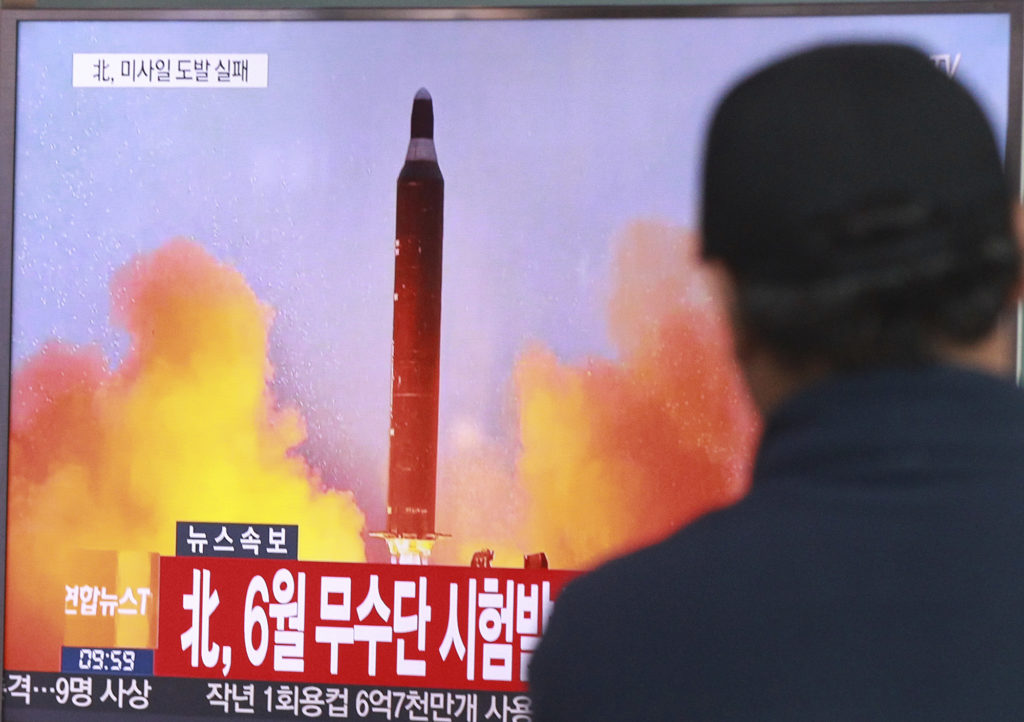
U.S. President-elect Donald Trump took to Twitter to vow that North Korea won’t develop a nuclear weapon capable of reaching parts of the United States. But it might already have done so. Views vary, sometimes wildly, on the exact state of North Korea’s closely guarded nuclear and missile programs, but after five atomic test explosions and a rising number of ballistic missile test launches, some experts believe North Korea can arm short- and mid-range missiles with atomic warheads. That would allow Pyongyang to threaten U.S. forces stationed in Asia and add teeth to its threat last year to use nuclear weapons to “sweep Guam, the base of provocations, from the surface of the earth.” Guam is a strategically important U.S. territory in the Pacific. Some experts see the U.S. mainland as potentially within reach in as little as five years if North Korea’s nuclear progress isn’t stopped. Trump’s tweet on Monday night U.S. time was in response to North Korean leader Kim Jong Un, who said Sunday in his annual New Year’s address that preparations for launching an intercontinental ballistic missile have “reached the final stage.” He did not explicitly say a test was imminent. Trump tweeted, “North Korea just stated that it is in the final stages of developing a nuclear weapon capable of reaching parts of the U.S. It won’t happen!” The morning after the tweet, top aide Kellyanne Conway said that while Trump was putting North Korea “on notice,” he was “not making policy at the moment.” Conway, who will serve as Trump’s White House counselor, said that as president, Trump “will stand between (North Korea) and missile capabilities.” North Korea, poor, suspicious of outsiders and governed by a third-generation dictator, is used to being underestimated and mocked. Few believed it could build a nuclear program that would keep U.S. presidents since the early 1990s up at night. Armed to the teeth, acutely bellicose and not afraid to push tensions on the Korean Peninsula to the brink, Pyongyang could be among Trump’s top foreign policy challenges. Here’s a look at how close North Korea may already be to proving Trump’s tweet wrong: — THE NUKES There’s a general consensus that Pyongyang has made significant nuclear and missile progress under Kim, who took over after his father, Kim Jong Il, died in late 2011. Kim has conducted three of the country’s five total nuclear tests, including two last year. Propaganda out of Pyongyang makes clear that North Korea views nuclear weapons as essential to keeping at bay U.S. and South Korean forces it says are intent on its destruction. Some U.S. experts believe North Korea may have enough fuel for about 20 bombs and can add a possible half dozen more each year. Fuel is one thing; it’s much more difficult to develop the technology needed to build bombs small enough to fit on missile tips. Each new nuclear test, however, pushes the North another big step toward its goal of an arsenal of nuclear missiles capable of hitting the U.S. mainland. — THE MISSILES Outsiders don’t know for sure whether North Korea can arm any of its ballistic missiles, regardless of range, with nuclear warheads yet. But Siegfried Hecker, a leading North Korea nuclear expert, wrote after last year’s September nuclear test that outsiders should now assume that Pyongyang has “designed and demonstrated” atomic warheads that can be placed on short- and possibly medium-range missiles. North Korea may deploy a “working, nuclear-tipped ballistic missile” by 2020, according to another expert, Euan Graham, director of the International Security Program at the Lowy Institute. North Korea has an arsenal of short-range Scuds and mid-range Rodong missiles, and some South Korean experts believe those can already be armed with nukes. That would put in danger the roughly 28,000 U.S. forces in South Korea and another 50,000 in Japan. While there’s not a consensus, some South Korean experts also believe the North can place a nuclear warhead on the more powerful mid-range Musudan missile, which could target Guam, about 3,000 kilometers (1,900 miles) away. Last year, after a string of failures, North Korea launched a Musudan missile that some experts considered a success. Kim Jong Un has already conducted more ballistic missile tests, including from submarines, in his short time in power than his father did during his entire 18-year reign, Graham wrote last year. This has allowed “refinements” in solid propellants, road mobility and experiments with vertical launches to high altitudes that could complicate U.S. and Japanese missile defense systems’ efforts to intercept, Graham wrote. — PUTTING IT TOGETHER Even if North Korea can fit a nuclear weapon on a missile, it has yet to meet the even greater challenge of building a nuclear-tipped ICBM capable of hitting the U.S. mainland. Since 2012, North Korea has conducted three satellite launches using long-range rockets, in what outsiders consider covers for banned tests of ICBM technology. As with the nuclear detonations, each new rocket test puts the North closer to having a nuclear missile that can target the U.S. mainland. Hecker estimates that it may take North Korea five to 10 years to succeed. — CHINA’S ROLE Another tweet from Trump criticized China, North Korea’s most important ally, for not doing more to discourage its nuclear weapons program: “China has been taking out massive amounts of money & wealth from the U.S. in totally one-sided trade, but won’t help with North Korea. Nice!” While Beijing has publicly reprimanded Pyongyang after nuclear tests and has agreed to rounds of U.N. sanctions against the North, critics say China hasn’t done enough to tighten economic pressure. Chinese foreign ministry spokesman Geng Shuang said China’s efforts and commitment to the dismantling of North Korea’s nuclear program are “consistent and clear.” “The effort China has made to this end is obvious to all,” Geng said in a regular briefing. “We hope all sides can refrain from speaking or doing anything that can aggravate the situation and work in concert to pull the issue back to dialogue and
Out of power, state Dems frustrated with national committee
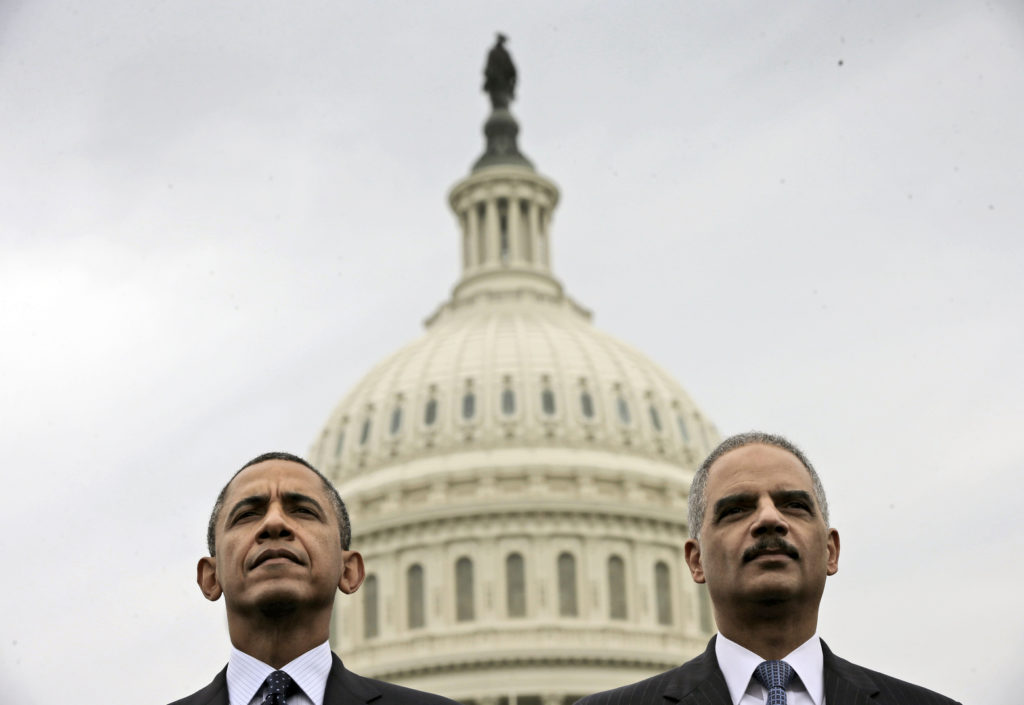
Democrats around the country are demanding change from a national committee they say has focused too heavily on the White House at the expense of governorships, legislatures and state party operations. “It’s got to be helping us organize in our states to be able to build that power at the state legislative level,” Michigan Democratic Party Chair Brandon Dillon said of the Democratic National Committee, currently searching for a new leader. “We’ve lost governorships and state legislatures at a rate that is pretty astounding.” DNC members gather in February to elect a new chairman, with five candidates running so far, each pledging to rebuild from the ground up. Money from the DNC to state parties has been inconsistent during President Barack Obama’s tenure and, in most states, less than it was under former chairman Howard Dean. Party chairs say that’s resulted in fewer staff members and training programs, a change felt particularly in Republican-leaning states. State leaders also say Obama’s grassroots group Organizing for Action has functioned more like competition than a partner. Beginning in 2017, Republicans will hold 33 governorships and fully control legislatures in 25 states, as well as the Congress and presidency. During Obama’s two terms in office, the party lost more than 1,000 seats at the state and national level. “I love President Obama, but he and his administration allowed for the deterioration, the terrible deterioration, of the state parties over the last eight years,” said Mark Brewer, who led the Michigan Democratic Party for 18 years. Obama has announced plans, though, to improve Democrats’ down-ballot fortunes once he leaves office. He is launching an initiative with former Attorney General Eric Holder aimed at making Democratic gains when states redraw legislative district lines following the 2020 census. Democrats have blamed Republican gerrymandering for some of their losses in Congress and state legislatures. State officials say it’s been hard to plan long term and recruit and train candidates in off-election years due to inconsistent funding from the DNC. Under Dean, the national party installed and paid several staff members in each state. But that program ended after Obama’s election. State parties began to receive monthly payments of anywhere from $5,000 to $10,000, an amount that varies depending on the year. At some point, the parties have received no money at all. The DNC does provide some money to state parties for elections based on the state’s competitive races and other factors. The change has left some states scrambling. The Nebraska Democratic Party, for example, paid five full-time staff members during Dean’s tenure. But when Dean’s “50-state strategy” ended, it was hard to keep one and pay the rent, said Maureen Monahan, a vice president of the Association for State Democratic Chairs from Nebraska. Some states, such Mississippi, do not pay their party chairs. Even in Michigan, a staff that once stood at more than a dozen now is between five and seven employees, party chairs said. “The past eight years we have not had any focus on the state parties,” Monahan said. “There’s been a sense that the DNC is a building in Washington.” The push-and-pull between state parties and the DNC is nothing new. State parties, congressional Democratic groups and the president’s allies often spar over how best to spend party resources. The DNC defended its involvement with states. “State parties are the lifeblood of the DNC, and we make investing in all of them a priority because they are an integral part of winning up and down the ballot. State parties were critical to picking up Senate seats, House seats, legislative chambers and governorships in 2016, and their importance will be a key focus for the party as we elect new officers in February,” DNC spokesman Adam Hodge said. Marcel Groen, Pennsylvania Democrats’ chair, said it’s unfair to blame Democrats’ troubles completely on the national party. But he said a focus on recruiting and running Democrats even in low level races in Republicans areas can help the top of the ticket in the long term. “We can’t expect people in rural areas, in red areas, to vote for our presidential candidates or our gubernatorial or Senate candidates if they’ve never seen a Democrat running for school board or county office,” he said. Republished with permission of The Associated Press.
Democrats extol health care law in bid to derail GOP repeal
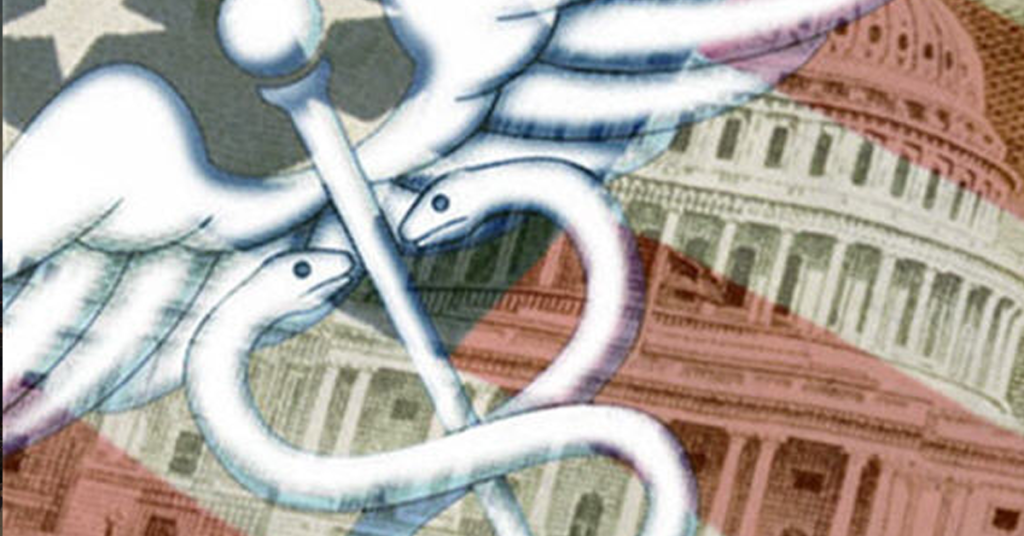
Senior House Democrats on Monday extolled the benefits of President Barack Obama‘s health care law in hopes of derailing Republican plans to gut the statute and over time replace it. In a conference call with reporters, House Minority Leader Nancy Pelosi said the GOP will begin its “assault” on the health care law when the 115th Congress convenes Tuesday. She said abolishing the law, known as the Affordable Care Act, as Republicans have promised will mean that people will pay more for their health insurance while getting much less than they do now. Undoing the law also will undermine Medicaid and Medicare, she said. Currently Republicans plan to vote quickly on repealing the health care law and delay the effective date to give them time to craft a replacement. Pelosi blasted that strategy as “an act of cowardice.” She urged people to “take a second look” at how the health care law has improved their lives. Minority Whip Steny Hoyer, the No. 2 Democrat in the House, said he believes that many people who voted for President-elect Donald Trump want the health care law preserved even though Trump made repeal of the statute a central part of his campaign. “I think a lot of people are going to be looking at this and saying, ‘Gee, I really didn’t mean that,’” Hoyer said. Republicans have opposed Obama’s law since Democrats steered the law through Congress in 2010. The GOP has tried numerous times to repeal the law but failed due to internal divisions and Obama’s veto power. But with the GOP in control of the House and Senate and Donald Trump set to become president in a few weeks, doing away with “Obamacare” is in sight for Republicans. GOP lawmakers are expected to spend the next several months working on legislation to cancel broad swaths of the law that the party’s voter base staunchly opposes. Most likely to go are the law’s mandate that people buy health insurance or face hefty IRS fines, and its expansion of Medicaid coverage to more lower-earning Americans. But several elements of the repeal likely wouldn’t go into effect for two to four years. Rep. Frank Pallone of New Jersey, the top Democrat on the House Energy and Commerce Committee, said Republicans are “blind to the success” of the health care law. Repealing the law is rooted in politics, he said, and will hurt middle class Americans. “Repealing the Affordable Care Act is not logical; it’s simply ideological,” Pallone said. Republished with permission of The Associated Press.
Former Alabama Gov. Albert Brewer dies

Albert Preston Brewer, who served as Governor of the Yellowhammer State following Gov. Lurleen Wallace’s death, has died. He was 88. Brewer served as Governor from 1968 to 1971. He also served as Lieutenant Governor and House Speaker. There were no immediate details on his cause of death. “Alabamians have lost a great leader today in the passing of Governor Albert Brewer,” Gov. Robert Bentley said. “He lived his life as an example of integrity and professionalism in public service, and displayed an unwavering commitment to making Alabama a great state. Always a friend to me, Governor Brewer was ever ready with a kind and encouraging word. Most of all he loved serving the people of this state.” State Auditor Jim Zeigler echoed Bentley’s sentiments. “Albert Brewer was governor when I was elected President of the SGA at the University of Alabama,” said Zeigler. “I got to work with him on several projects, and he was a straight arrow. We have lost an important piece of our history, as his family has lost their loved one.” Other Alabamian politicos were also sad to hear of Brewer’s passing. “Saddened to learn of passing of a great Alabamian and friend, former governor Albert Brewer. Prayers to his family,” tweeted Attorney General Luther Strange. State Sen. Arthur Orr also tweeted, “So sad to hear of passing of former Governor Albert Brewer. He was Morgan Co’s favorite son. A true public servant and always a gentleman.” Since his days in politics, Brewer had been teaching constitutional law to students at Birmingham’s Samford University. “The Samford University and the state of Alabama have lost a giant in the passing of Gov. Albert Brewer,” said Samford president Andrew Westmoreland. “He was loyal to the university, to his family, to his state and to his God and was the epitome of a Christian gentleman. He served the university with distinction, as he did everything in life, and taught constitutional law to generations of students.”

